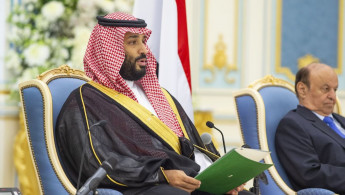Crown Prince Mohammed bin Salman says he plans a complete overhaul of Saudi legal system
Saudi Arabia is moving toward the codifying its legal system.
2 min read
MbS is set to overhaul the Saudi legal system [Getty]
Saudi Arabia is planning a complete overhaul of its legal system to bring it in-line with international norms, the kingdom's crown prince has said.
Four new draft laws - the personal status law, the civil transactions law, the penal code of discretionary sanctions, and the law of evidence - will soon be approved by the relevant bodies, Crown Prince Mohammed bin Salman said according to Saudi Press Agency.
"The new laws represent a new wave of reforms that will... increase the reliability of procedures and oversight mechanisms as cornerstones in achieving the principles of justice, clarifying the lines of accountability," the crown prince said in a statement.
The standardisation of the legal system will help fix "discrepancies" and "a lack of clarity" in the current system, particularly toward family law and guardianship rules.
These, he said, had caused immense hurt and harm to women in the kingdom.
"That resulted in prolonged litigation not based on legal texts. In addition, the absence of a clear legal framework for private and business sectors has led to ambiguity with respect to obligations," he said according to Saudi media.
"This was painful for many individuals and families, especially women. It also permitted some people to evade their responsibilities. This will not take place again."
Saudi law previously saw all women assigned a guardian, usually a father or brother, who could dictate their travel, work and other lifestyle choices.
The crown prince changed the guardianship system in 2019, after a number of women activists who fled the country brought international attention to the issue and widespread criticism of the law.
Four new draft laws - the personal status law, the civil transactions law, the penal code of discretionary sanctions, and the law of evidence - will soon be approved by the relevant bodies, Crown Prince Mohammed bin Salman said according to Saudi Press Agency.
"The new laws represent a new wave of reforms that will... increase the reliability of procedures and oversight mechanisms as cornerstones in achieving the principles of justice, clarifying the lines of accountability," the crown prince said in a statement.
Saudi Arabia has no codified legal system but the new reforms will change this for four key aspects of the law, a source told Reuters.
It would mean a legal system that retains its traditional characteristics, under sharia law, but "definitely moving towards codifying the entire law" to suit modern demands, the source told the agency.
"While there is a decent and independent judiciary, the main criticism is that it is not consistent and judges have significant discretion on many of these issues, which leads to inconsistency and unpredictability," added the Saudi official.
The new laws will be announced in 2011, the prince said, who said they will meet international standards but not contradict sharia law.
|
|
It would mean a legal system that retains its traditional characteristics, under sharia law, but "definitely moving towards codifying the entire law" to suit modern demands, the source told the agency.
"While there is a decent and independent judiciary, the main criticism is that it is not consistent and judges have significant discretion on many of these issues, which leads to inconsistency and unpredictability," added the Saudi official.
The standardisation of the legal system will help fix "discrepancies" and "a lack of clarity" in the current system, particularly toward family law and guardianship rules.
These, he said, had caused immense hurt and harm to women in the kingdom.
"That resulted in prolonged litigation not based on legal texts. In addition, the absence of a clear legal framework for private and business sectors has led to ambiguity with respect to obligations," he said according to Saudi media.
"This was painful for many individuals and families, especially women. It also permitted some people to evade their responsibilities. This will not take place again."
Saudi law previously saw all women assigned a guardian, usually a father or brother, who could dictate their travel, work and other lifestyle choices.
The crown prince changed the guardianship system in 2019, after a number of women activists who fled the country brought international attention to the issue and widespread criticism of the law.
There has been talk of a codified sharia law in Saudi Arabia in the past.





 Follow the Middle East's top stories in English at The New Arab on Google News
Follow the Middle East's top stories in English at The New Arab on Google News


